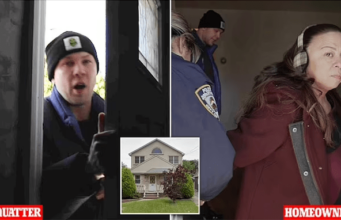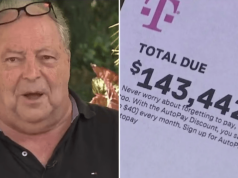Woman runs over man, 70, who offered to pay her for sex, killing him
Alyssa Bray hits and kills man, 70 year old Spokane, Washington State man, Gerald Fox with his own truck after he picked up from...
Queens squatter charged with ‘stealing’ homeowner’s $1M home
Brian Rodriguez, Queens squatter indicted for illegal occupancy of Flushing $1M home after homeowner Adele Andaloro was previously arrested for changing locks on the...
Indiana woman calls 911 to report meth dealer sold her bad sh*t
Sarah Harris repeat serial offender and meth drug addict from Indiana calls 911 to report meth dealer after they sold her a bad batch...
1 year old boy dies after ‘accidentally’ falling out of 3rd floor hotel window;...
Madden Hein 1 year old Minnesota toddler dies after falling out of 3rd floor hotel window at South Dakota hotel while with his parents....
Woman wheels dead uncle into Brazil bank to (unsuccessfully) co-sign loan
Erika de Souza, Brazil woman wheels her dead uncle into Rio de Janeiro bank to (unsuccessfully) co-sign loan as she now faces charges. Dead...
US tourist charged $143K in roaming fees by T-Mobile who refuse to budge
Rene Remund charged $143K in roaming fees by T-mobile phone carrier during trip to Switzerland after being told he was covered by his plan....
Student suspended for using ‘illegal alien’ infront of Hispanic classmates
Christian McGhee, Lexington, North Carolina student using term 'illegal alien' in class a victim of political correctness? Teen at Central Davidson H.S suspended for...
Winston-Salem ‘black’ student slaps white teacher in front of laughing class
Aquavious 'Quavo' Hickman, Winston-Salem, North Carolina 'black' student at Parkland High School charged with assault after slapping 'white' teacher during class as fellow classmates look...
Family sues for $20M after 11 year old ate dirty Wendy’s hamburger & nearly...
Aspen Lamfers lawsuit: Michigan family sue Wendy's outlet in Jenison after 11 year old develops brain damage after eating contaminated food at the 'dirty'...
How Being Overweight or Obese Can Impact Your Mental Health
The impact on mental health being overweight or obese. The physical consequences of weight gain are known but what about the mental well being?...
Phony cop in ballistic vest & body camera arrested trying to pull over real...
Shaun Arnold serial cop impersonator arrested trying to arrest real deputies in Houston, Texas. Convicted felon was found equipped with ballistic vest, body camera...
Missing Texas mom & daughter, 4, found dead after car crashing into pond
Missing Texas mother, Lauren Bonvillian and her 4 year old daughter Savannah Bagley are found dead after their car they'd been traveling in crashed into...
Uber driver killed by Ohio man, 81, after both set up by scammer
Loletha Hall Uber driver shot dead by William Brock Ohio 81 year old 'white' man in a scam call gone deadly as both the...
Married Nebraska teacher busted having sex w/ student is wife of Department of Defense...
William 'Doug' Ward husband of Omaha Nebraska teacher, Erin Ward arrested for having sex with teen student revealed to be high ranking government defence...
Smiling Islamist, 15 year old teen boy attacked after Bishop stabbing
Bishop Mar Mari Emmanuel stabbing: 15 year old teen boy believed to be Islamist seen smiling after attack at Sydney's Christ The Good Shepherd...
























